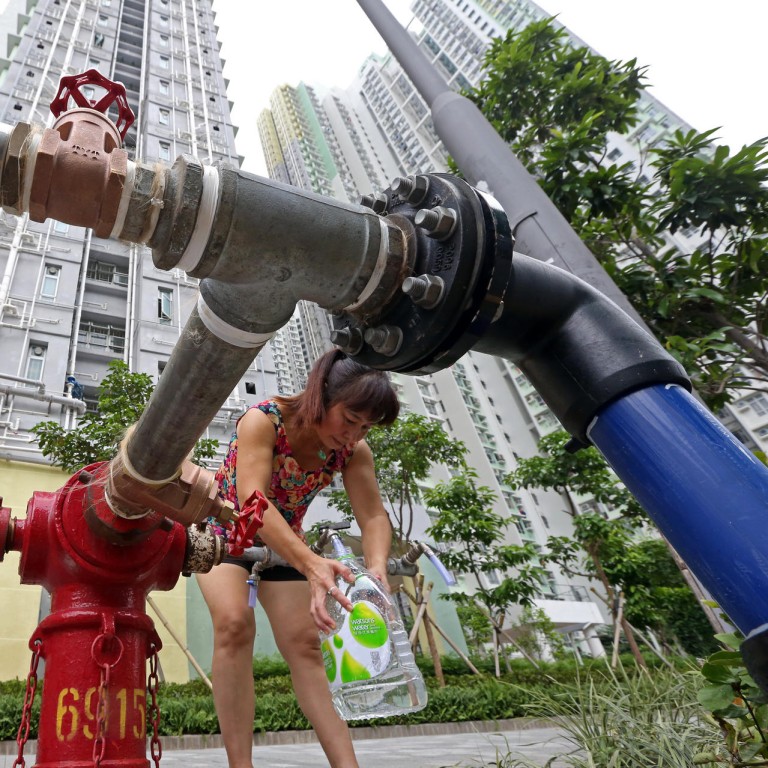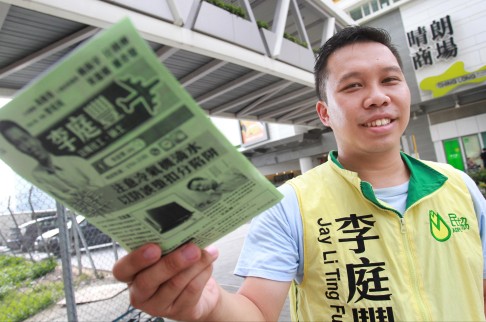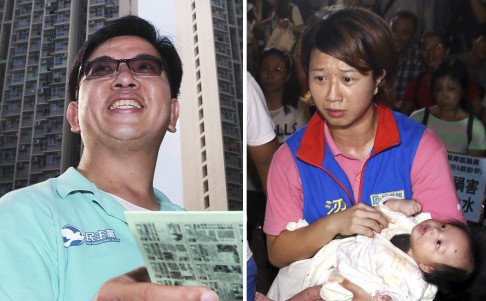
Hong Kong district council hopefuls use lead-in-water scare to show their mettle
Candidates in next month's polls have used the summer's tainted water scandal as a way to show their mettle in the communities affected
For residents of 11 public housing estates, street-level politics might feel closer to home than ever ahead of next month's district council elections.
After weeks of using buckets to collect clean drinking water, they are now reliant on water filters at home as the city gets to grips with the discovery of excessive levels of lead in tap water. For parents, the worries continue - will having consumed excessive lead have a long-term developmental effect on their children?
It is understandable, in those circumstances, that many residents have been looking for help and advice wherever they can get it.
READ MORE: District Council elections: battle renewed in a shifting political landscape
The crisis has therefore provided an opportunity for would-be district councillors to show off their ability to work for the community, or put them to the test.
While the contamination was exposed by members of the pan-democratic camp, its candidates said their work on the incident had impressed some voters, but they were cautious about whether it would be enough to defeat their pro-establishment rivals.
In Kowloon City district, Kai Ching Estate - where the tainted water scandal first came to light - has become one of the hottest battlegrounds in the election. Along with the adjacent Tak Long Estate, it forms part of the new Kai Tak North constituency, a new seat created to reflect the development of the new housing estates on the site of the former airport.

The other two registered candidates, Miranda Lam Hei-ting and Chan Po-yuk, could not be reached for comment.
The ADPL first took up the cause of water quality on the estate long before the issue became a citywide talking point. It first received a complaint about water quality in January from a Kai Ching resident, and took the faucets from the man's flat for laboratory testing. After finding that the alloy composition of the taps failed to meet official standards, the party wrote to the Housing Department to quietly complain on behalf of the resident.
But it was Democratic Party lawmaker Helena Wong Pik-wan who made the matter public in July after the party found excessive lead in water samples from a number of homes on the estate.
Li, the ADPL's community officer in Kai Tak, soon joined his fellow pan-democrats to form the Drinking Water Victims Alliance. He said he had been helping residents on a range of matters such as contacting government departments to track progress on the installation of water filters in their homes.
One of the residents he had been working with has now been referred to the alliance's legal team and is joining a judge-led investigation into the scandal as a representative of the victims.
His opponent Leung formed the Lead in Drinking Water Concern Group and became its convenor. After tests by the Democratic Party and the government at Kai Ching, she organised water tests for a further 704 households and blood tests for 25 residents.
"The incident may have positive effects on the pan-democratic camp's publicity in the election. But does it mean we will win? Not necessarily. I think voters will consider candidates' full track records in the constituencies," Li said.
The pan-democrat said he had laid out remedial plans for dealing with the lead-in-water incident in his election platform
"I am advocating for the Legislative Council to invoke its special powers to launch an investigation and to fight for appropriate compensation for residents; a replacement of all drinking water pipes in the estate; and free blood tests for elders and residents suffering from chronic illnesses to check any health effects of lead on them," he said.
The has tried to reach Leung for comments repeatedly since last Wednesday and has not heard back from her since she sent an email that day saying she was busy.
Another area where the lead-in-water scandal could have an impact is Kwai Luen Estate in Kwai Tsing district.

In an emotional town hall meeting after the estate was found to have excessive lead in water, the DAB member was seen carrying a resident's baby girl born with black marks on her skin and confronting housing officials on whether the infant's condition had been caused by lead.
The episode, captured by the media, soon became a laughing stock on the internet as doctors said there was no medical evidence suggesting lead consumption could cause black marks.
Michelle Leung declined the 's invitation for an interview, saying she was too busy.
Incumbent Ng Kim-sing, a Democratic Party member seeking to hold his seat for a sixth term, would not comment on his opponent's performance but said the incident had helped residents discern between different political parties.
"I am sure the incident has some impact on the election. Some residents might not have paid attention to the differences among political parties in the past but now they have seen how different parties handled the incident differently," said Ng, who held his seat by a little over 100 votes in 2011.
Ivan Choy Chi-keung, a Chinese University political scholar, said the water scare might benefit pan-democrats in the coming polls, albeit marginally.
"In the past, the pro-government camp often accused pan-democrats of only paying attention to politics and ignoring livelihood issues," Choy said. "
This incident has provided a defence for pan-democrats. However, the election falls a few months after the discovery of lead so it may not be so decisive in the voting results."
Voters go to the polls on November 22 to elect 431 councillors to 18 district councils.
